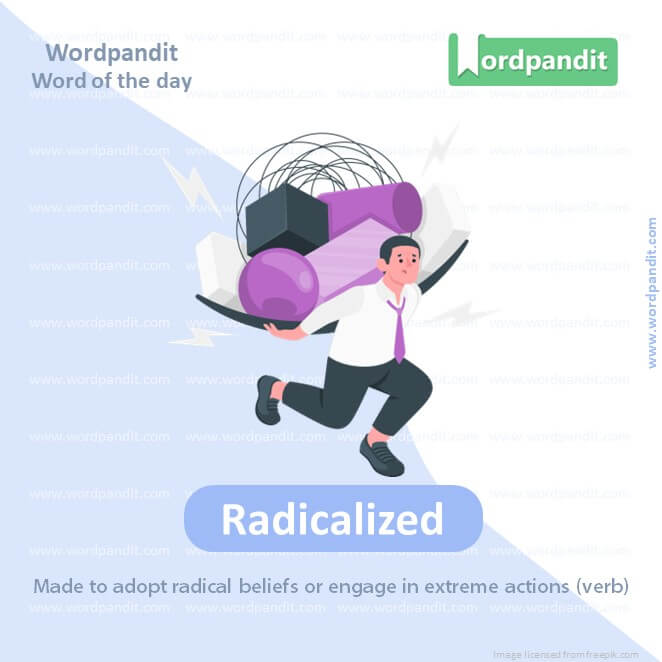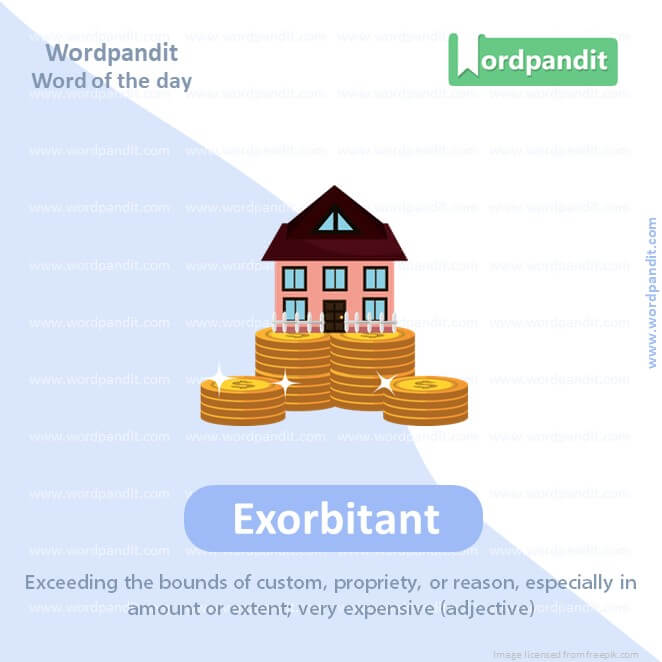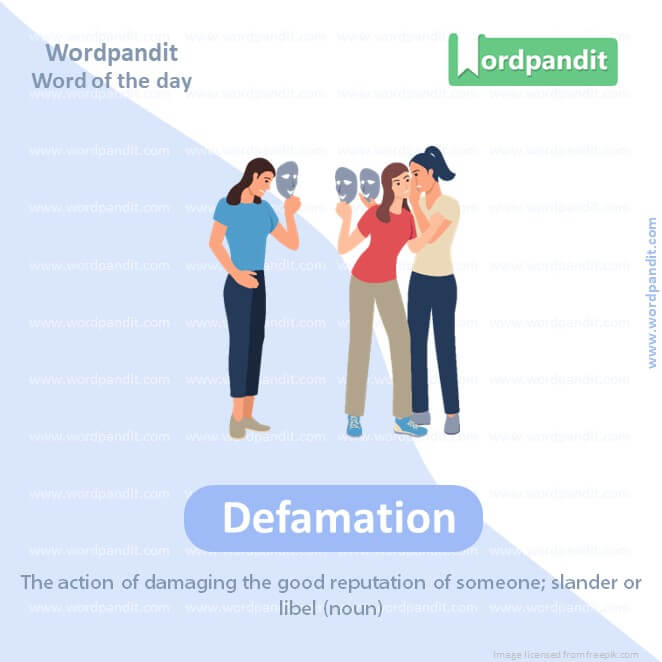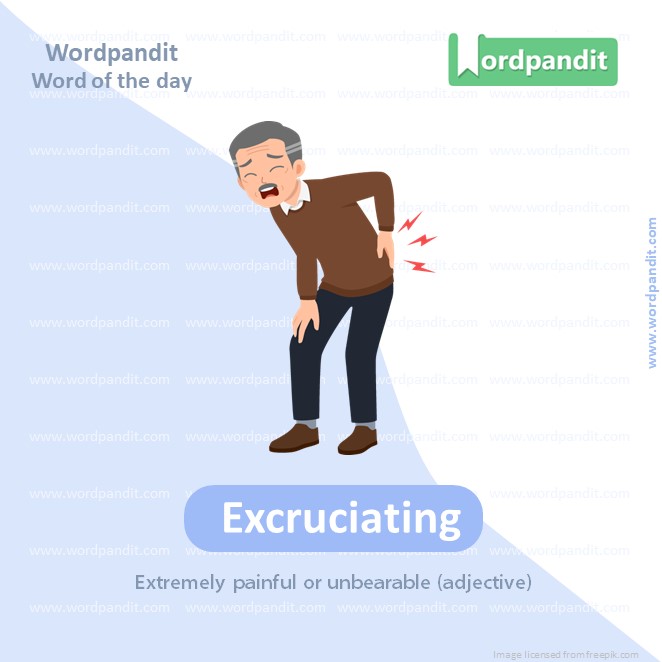Daily Vocabulary Words: List of Daily Used Words in Leading International Newspapers
Hi there. Welcome to this special section @ Wordpandit.
Our endeavour here is very simple: to highlight important daily vocabulary words, which you would come across in leading newspapers in the country. We have included the following newspapers in our selection:
• The New York Times
• The Washington Post
• Scientific American
• BBC
• The Guardian
• Psychology Today
• Wall Street Journal
• The Economist
We are putting in extensive work for developing your vocabulary. All you have got to do is be regular with this section and check out this post on a daily basis. This is your repository of words that are commonly used and essentially, we are posting a list of daily used words. Hence, this has significant practical application as it teaches you words that are used commonly in leading publications mentioned above.
Visit the website daily to learn words from leading international newspapers.
WORD-1: Deference
CONTEXT: It was such a softball interview that Putin professed exasperation at the deference and said he wished he’d been asked sharper questions.
SOURCE: New York Times
EXPLANATORY PARAGRAPH: Imagine you really respect someone, like your favorite teacher or a superhero, so when they talk, you listen quietly and do what they say because you think they are very important. That’s like showing deference; it’s when you are very respectful and show that you think someone is special or important.
MEANING: The act of showing respect and submission to someone or something, often by yielding to their opinions or wishes (noun).
PRONUNCIATION: DEF-er-ens
SYNONYMS: Respect, Reverence, Submission, Obedience, Honor
USAGE EXAMPLES:
1. She showed deference to her coach by listening carefully during the training session.
2. In deference to the community leader, the villagers agreed to follow the new rules.
3. His deference to his grandmother was evident in the way he always asked for her advice.
4. The young knight showed deference to the king by bowing deeply before speaking.
WORD-2: Combustion
CONTEXT: We could spend money making buildings more fireproof. Or we could invent new flammable objects that would satisfy arsonists’ desire to burn things down but whose combustion would cause less societal harm.
SOURCE: New York Times
EXPLANATORY PARAGRAPH: Combustion is like when you see a fire burning wood or paper. It happens when something catches fire and burns, usually with flames, because it’s mixing with air and getting very hot. This is how cars move and rockets fly to space, by burning fuel.
MEANING: The process of burning something, which involves a chemical reaction between a substance and oxygen, producing heat and light (noun).
PRONUNCIATION: kuhm-BUS-shun
SYNONYMS: Burning, Ignition, Fire, Flaming, Blaze
USAGE EXAMPLES:
1. The combustion of gasoline powers cars and motorcycles.
2. Firefighters study combustion to understand how fires start and spread.
3. The rocket’s engines use the combustion of fuel to lift off into space.
4. Scientists are researching cleaner combustion methods to reduce pollution.
WORD-3: Curtailing
CONTEXT: Is that shutting down or curtailing the production of fossil fuels leaves nothing to chance, in contrast to more indirect measures to reduce greenhouse gas emissions such as setting a price for carbon.
SOURCE: New York Times
EXPLANATORY PARAGRAPH: Imagine you have a big box of crayons, but your mom says you can only use a few of them and puts the rest away. Curtailing is like when someone makes something shorter or smaller because it’s too much or not needed right now, like having fewer crayons to play with.
MEANING: The act of reducing, decreasing, or limiting something, or making it shorter in duration or extent (verb).
PRONUNCIATION: kur-TAIL-ing
SYNONYMS: Reducing, Shortening, Diminishing, Decreasing, Limiting
USAGE EXAMPLES:
1. The company is curtailing expenses to avoid bankruptcy.
2. The new law aims at curtailing noise pollution in urban areas.
3. Due to the drought, water usage was curtailed across the region.
4. The library’s hours have been curtailed due to budget cuts.
WORD-4: Mischievously
CONTEXT: He mischievously attempted to unionize prisoners and guards alike.
SOURCE: New York Times
EXPLANATORY PARAGRAPH: Imagine you’re playing a prank on your friend by hiding their toy, and you’re doing it in a playful way that’s not meant to hurt anyone. When you do something mischievously, it means you’re being a little bit naughty or playful in a fun way, like playing a harmless trick.
MEANING: In a playful or naughty manner that causes minor annoyance or harm, often showing a sense of fun or teasing (adverb).
PRONUNCIATION: MIS-chuh-vus-lee
SYNONYMS: Playfully, Naughtily, Impishly, Slyly, Waggishly
USAGE EXAMPLES:
1. He smiled mischievously before jumping out to surprise his friends.
2. The cat looked at us mischievously before knocking over the vase.
3. She mischievously hid her brother’s toy to tease him.
4. The children mischievously decorated the classroom for the surprise party.
WORD-5: Baffling
CONTEXT: It’s baffling how many Americans have responded in the opposite way, by acting as Putin’s poodles.
SOURCE: New York Times
EXPLANATORY PARAGRAPH: Imagine trying to solve a puzzle but the pieces don’t seem to fit anywhere, and it’s really confusing. Baffling is when something is so confusing or hard to understand that it makes you scratch your head, wondering how to figure it out.
MEANING: Causing confusion or bewilderment, difficult to understand or solve (adjective).
PRONUNCIATION: BAF-ling
SYNONYMS: Confusing, Perplexing, Mystifying, Bewildering, Puzzling
USAGE EXAMPLES:
1. The detective faced a baffling case with no clear motive.
2. The magician’s trick was so baffling that no one could figure out how it was done.
3. The sudden disappearance of the statue was baffling to the whole town.
4. Scientists find the behavior of the particles baffling and fascinating.

WORD-6: Radicalized
CONTEXT: Carlson goes shopping in Moscow, spends less money than he expects and says the experience radicalized him against America’s leaders.
SOURCE: New York Times
EXPLANATORY PARAGRAPH: Imagine if someone started believing very strongly in new ideas that are very different from what most people think, and they want to make big changes based on those ideas. Being radicalized means getting so passionate about these big, new ideas that you want to help change things in a big way.
MEANING: Made to adopt radical beliefs or engage in extreme actions (verb).
PRONUNCIATION: RAD-i-ka-lized
SYNONYMS: Extremized, Polarized, Fanaticized, Mobilized, Activated
USAGE EXAMPLES:
1. The documentary explored how young men were radicalized online.
2. Efforts are being made to prevent the radicalization of students.
3. The group was radicalized by the charismatic leader’s speeches.
4. She became radicalized after witnessing the injustices firsthand.
WORD-7: Buttressed
CONTEXT: That is the Russia that too many Americans have buttressed by opposing aid to Ukraine.
SOURCE: New York Times
EXPLANATORY PARAGRAPH: Imagine building a big sandcastle and adding extra piles of sand at the sides to make sure it doesn’t fall down. Buttressed is like when you support or make something stronger, like adding those piles of sand to keep your castle standing up.
MEANING: Strengthened, supported, or reinforced physically or figuratively (verb).
PRONUNCIATION: BUH-trest
SYNONYMS: Strengthened, Supported, Reinforced, Fortified, Bolstered
USAGE EXAMPLES:
1. The bridge was buttressed with additional beams to ensure safety.
2. His argument was buttressed by facts from reputable sources.
3. The sea wall was buttressed to withstand stronger storms.
4. The team’s morale was buttressed by the unexpected victory.

WORD-8: Exorbitant
CONTEXT: Environmentalists would be OK if restricting production of fossil fuels pushed up prices of gasoline, heating oil and other products, so long as the increases weren’t exorbitant, because that would strengthen the financial incentive to develop green energy.
SOURCE: New York Times
EXPLANATORY PARAGRAPH: Imagine you want to buy a small toy, but the price tag shows a super huge number, way more than your entire piggy bank savings. Exorbitant means something costs a lot more money than it should, like a toy being priced as if it were a treasure.
MEANING: Exceeding the bounds of custom, propriety, or reason, especially in amount or extent; very expensive (adjective).
PRONUNCIATION: ex-OR-bi-tant
SYNONYMS: Excessive, Overpriced, Steep, Inflated, Pricey
USAGE EXAMPLES:
1. The exorbitant cost of the medicine makes it unaffordable for many.
2. Renting a small apartment in the city can be exorbitantly expensive.
3. The hotel charged exorbitant rates during the peak season.
4. Critics argue that the project’s budget is exorbitant and wasteful.

WORD-9: Defamation
CONTEXT: Mr. Trump’s company was found guilty of 17 felonies, including fraud, and an earlier Carroll civil jury ordered him to pay $5 million for sexual assault and another act of defamation.
SOURCE: New York Times
EXPLANATORY PARAGRAPH: Imagine someone tells a lie about your best friend that makes others think badly of them. Defamation is when someone says something untrue and mean about another person that can hurt their reputation or how others see them.
MEANING: The action of damaging the good reputation of someone; slander or libel (noun).
PRONUNCIATION: def-a-MAY-shun
SYNONYMS: Slander, Libel, Vilification, Calumny, Disparagement
USAGE EXAMPLES:
1. The politician sued for defamation after false accusations were made against her.
2. Spreading rumors online can lead to defamation lawsuits.
3. The article was criticized for its potential to cause defamation of public figures.
4. Defamation laws protect individuals from unwarranted attacks on their character.

WORD-10: Excruciating
CONTEXT: Mr. Trump sat at the defense table, day after day, through testimony that was excruciatingly boring, in the business fraud trial, and just plain excruciating, in the Carroll case.
SOURCE: New York Times
EXPLANATORY PARAGRAPH: Imagine falling and scraping your knee really badly, and it hurts a lot. Excruciating is when something feels extremely painful, way more than just a little ouch, like the worst kind of hurt you can imagine.
MEANING: Extremely painful or unbearable (adjective).
PRONUNCIATION: ex-CRU-ci-ating
SYNONYMS: Agonizing, Torturous, Intense, Severe, Unbearable
USAGE EXAMPLES:
1. He was in excruciating pain after the accident.
2. The migraine headache was so excruciating that she couldn’t get out of bed.
3. Waiting for the test results was excruciating.
4. The athlete endured excruciating training sessions to prepare for the competition.
vocabulary building in english
The prowess of a language learner is often evaluated by their command over vocabulary. Undeniably, vocabulary building in English is of paramount importance when it comes to mastering the language. Not only does it enrich communication skills but also boosts confidence and comprehension levels. So, how can one truly succeed in vocabulary building in English?
One of the significant aspects of vocabulary building in English is recognizing your existing lexicon’s confines. The evaluation helps set definitive goals towards the expansion of your vocabulary. Subsequently, immerse yourself in English content, be it books, news articles, podcasts or movies. This immersiveness provides exposure to new words, their usage, and context, crucial elements in vocabulary building.
Now, you have identified new words, but how do you retain them? The key is reiteration and practical application. Adopt a habit of daily revision and try using the words in your conversations or writings. Don’t fear mistakes, for they are stepping stones to the proficiency you desire in vocabulary building in English.
Next, understanding the structure of the English word, utilizing the roots, prefixes, and suffixes, can significantly elevate your vocabulary building endeavor. This strategy aids in decoding a word’s meaning and can prove instrumental in expanding your word arsenal. Remember, languages often borrow words from each other, grasping these borrowed words’ roots can substantially simplify vocabulary building in English.
Lastly, incorporating fun into learning can stimulate progress. Engage in crossword puzzles, word games, or digital apps like Duolingo or Quizlet. These platforms not only provide a fun-method to reinforce new words but also help track your progress in vocabulary building in English.
To sum up, the journey of vocabulary building in English must begin from self-evaluation, proceed with content exposure, practice, decoding, and end in a fun-oriented learning approach. The intricate layering of these methods helps you unlock the essence of this globally spoken language. Remember, the process may seem tedious initially, but with time and practiced techniques, the task of vocabulary building in English will become effortless and rewarding.







